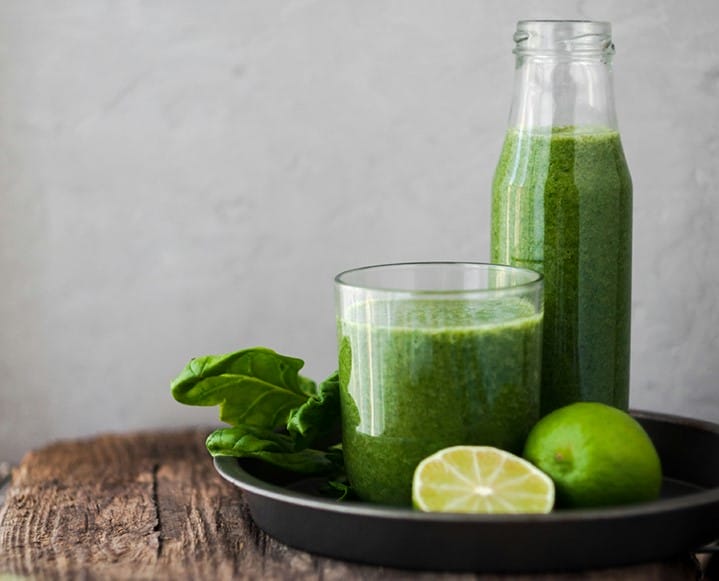For four years now, Colon Hydrotherapist Kortney Sanders has been transforming the microbiomes of some of the most elite clientele from all over the world at the famed We Care Spa in Desert Hot Springs.
There’s a ton of information out there about cleanses, and plenty of mainstream backlash. Holistic detoxification programs—from juice cleanses to colonics—have been treasured by the wellness set for ages, but thanks to the internet, it can be really hard to determine which cleansing protocols are effective and actually provide meaningful benefits.
As we head into spring, which is an optimal time to reset, reground, and plant new seeds for the season to come, we turned to the famed We Care Spa, which changed our lives during the winter. We got the “juice” from expert Colon Hydrotherapist Kortney Sanders, who has worked with some of the most elite clientele from all over the world in helping them optimize their cleanse. We asked Sanders to give us her thoughts on doing a fast, cleanse, or detox in the most gentle and effective way possible. Some of her tips may surprise you…
Preparation Matters
Preparing to cleanse is just as important as doing the cleanse itself! I’ve seen guests who have done absolutely no prep for their fast, and that is a totally different experience than guests who committed to cutting out inflammatory components of their lifestyle in advance.
In order to get a truly effective detox, you need time to get rid of surface-level toxins that come from everyday pleasures like coffee, sugar, alcohol, even red meat. If you haven’t started to cut out the things that cause those surface-level toxins, it can be really uncomfortable during a cleanse because your body is essentially getting “shaken up,” and these toxins are trying to leave in a state of chaos, which can cause more significant Herxheimer reactions.
When your body has been “pre-cleansed,” it has the opportunity to focus all of its energy on effectively getting rid of deeper-level toxins.
Nourish Throughout Your Detox
There are a great number of fasts, cleanses, and detoxes. Even the phrase “juice cleanse” or “liquid fast” can mean a lot of different things, depending on how it’s being performed.
At We Care, we structure our programming around “liquid nutrition,” which we consider a nutritive fast that is fast-mimicking rather than one that completely deprives the body of essential nutrients. In order for your body to have enough energy to fight against toxins, it needs a certain level of probiotics, gut bacteria, electrolytes, vitamins, and minerals.
We make sure all of our guests are getting this well-rounded nutrition—in spite of consuming less than 400 calories per day—but in liquid form so the body doesn’t have to spend so much time trying to break it down. If the nutrients you’re getting are already accessible and easily absorbable, your body can leverage that remaining energy it would otherwise need to digest, and use it to help the body heal and get rid of toxins and pathological cells.
Fun fact: About 30% of the energy you get from solid food is directly used to digest it. That’s a lot of energy being spent just to make sure you can digest your food!
If you don’t have the time to commit to a full, leave-your-life-behind cleanse, one way to encourage your body’s detoxification at the most basic level is to have one liquid meal per day—like a protein shake or a nutrient-rich green juice.

Include Supportive Supplements
Supplementation is super important when it comes to an effective, supportive cleanse. Here are some of the supplements we love at We Care:
Enzymes | There are two types of enzymes: Plant-based and animal-based.
Plant-based enzymes are naturally occurring enzymes, which should be in the food that grows in the wild. Thanks to modern-day agriculture, the enzymes and nutrition in our food has massively depleted, so we rely on them to help break down solid foods (even the ones that might still be sticking around in your system). Especially during a cleanse, plant-based enzymes continue to get to work to break down solid food and allow your small intestine to absorb any remaining valuable nutrition.
Animal-based enzymes, on the other hand, typically replace enzymes that bodies should be naturally producing, but are struggling to do so. If you really need them, or have been advised by a professional to take them, that’s one thing. However, they can create bodily dependency over time, making your body’s own enzymatic function lazy.
Probiotics | A cleanse is a great time to work on your gut’s microbiome. At We Care, our guests take probiotics and prebiotics, so your body can use the time where nothing is really “going on” to help rebuild your gut with what it’s been missing.
Milk Thistle + Dandelion Root | Some of our guests opt to perform a phosphorus liver flush during their cleanse. While your body rests, it’s a great time to focus on the liver, using liver-supporting herbs like milk thistle and dandelion root.
We also give our guests the option to perform a parasite cleanse (did you know between 60 and 75% of people have some kind of parasite living inside of them?!). While getting rid of parasites, you can’t eat any sugar, spicy foods, or carbohydrates, making a fast the perfect time for a parasite cleanse. However, these cleanses can require a bit more planning and time (given that parasites sync up with the phases of the moon).
We definitely don’t recommend trying to tackle your liver, gallbladder, and parasites all at the same time. Just pick one!
Focus On Detoxing Through Multiple Body Systems
We have five major organs of elimination—your gut, your skin, your lymphatic system, your liver, and your kidneys.
Here are some things you can do to support each vital system:
Gut | Your gut is your body’s default organ to remove things from the colon, which is why we love colonics as a great and effective way to do this. When you’re fasting, you’re not necessarily having solid movements on your own, but the default system of your body is to collect all of these toxins from these newly energized cells, which are sinking into your colon.
Skin | The other organ of elimination is your skin (which is also your body’s largest organ!). Sweating out toxins by sitting in a sauna or dry brushing to open up the pores to detox the skin is incredibly effective. Just note: When your body starts detoxing, it can sometimes push toxins through the skin, which can result in acne in the process. It’s totally normal and will clear up!
Lymphatic System | The lymphatic system is the only fluid-moving system in your body that doesn’t have its own pump. Given that the lymph system is like your body’s very own garbage disposal, stimulating it is essential to properly eliminating toxins. This process of getting the system to move things through doesn’t require a heavy lift. Dry brushing, rebounding, exercise, massages, facials, and gua sha are some basic examples of things you can do no matter where you are.
Liver + Kidneys | Your liver and kidneys are majorly responsible for your body’s detoxification processes, which means they need extra support during times of cleansing. When you enter a heavy detox or cleanse, all of the toxins that have been hanging around get stirred up and need to be processed through the liver. As mentioned before, milk thistle and dandelion root are incredible herbs for this process. The kidneys, which are helping the liver, can benefit from herbs like pau d’arco, which is great for the kidneys, blood, and even candida.
You can also consider a castor oil packs on your stomach during a sauna for 15-25 minutes.

Take Time To Rest
The whole point of a cleanse—beyond detoxing—is to give your mind and body true rest.
People are always wondering if they can continue exercising, working, or socializing during a cleanse. At We Care, we’d say “honor what you’re doing.” Don’t overwhelm yourself or make things so intimidating that you’re afraid to even do it. Whatever process or integration you choose, it needs to be approachable and manageable. During any fast, we recommend avoiding anything that involves over-exerting your body or attempting to keep all wheels in your life turning.
I, personally, love that it’s called a “fast” when you’re actually being asked to be slow. It’s okay to pause. Once you allow yourself not to have all of your daily comforts (like potato chips or your daily spin class), you start to learn more about yourself emotionally and mentally, as well as your relationship to food. It can be a stressful thing to become aware of, which is why we have additional tools to support those moments like breathwork and yoga.
Make Reintegration Nice And Slow
It’s always interesting when people living more cosmopolitan lives, who are used to being go, go, go, want to be “fixed” when they come out of We Care. But, when you leave, you need to be able to find a way to integrate these changes into your real life.
After your cleanse, your transition from fasting to eating solid foods again needs special attention. Remember, your organs have been resting and repairing themselves, so you’ll want to take “baby steps” in guiding them back to breaking down, digesting, assimilating, and eliminating solid food. To help make this transition as easy as possible for you, we recommend breaking the fast over the same amount of days as you’ve fasted.
We would recommend…
Days 1-3 | Organic and locally sourced fruits, salads, soups, and veggies.
Day 4 | Add in more complex plant food such as seeds, whole grains, brown rice, and legumes.
Day 5 | Start to integrate wild fish (salmon, sardines, or herring), if desired.
Day 6 | Add organic poultry and goat dairy, if desired.
Day 7 | While we don’t recommend it, this would be the best point to add in grass-fed, free-range red meat, coffee, and/or alcohol.
Happy cleansing!
*The Chalkboard Mag and its materials are not intended to treat, diagnose, cure or prevent any disease. All material on The Chalkboard Mag is provided for educational purposes only. Always seek the advice of your physician or another qualified healthcare provider for any questions you have regarding a medical condition, and before undertaking any diet, exercise or other health-related programs.













